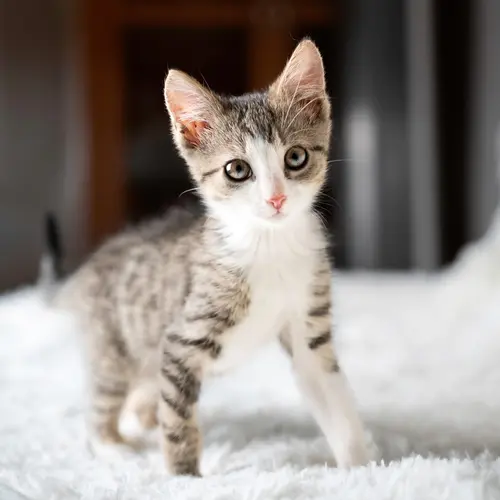Cat gastritis, also called “feline gastritis,” is a type of inflammation of the stomach seen in cats. There are two main types of gastritis: acute and chronic. Acute gastritis comes on suddenly and lasts for a short time. Chronic gastritis develops and persists for a longer period of time. The symptoms and treatments can vary for each. Early treatment is key, though, to helping your cat recover from the condition quickly. Here’s what you need to know about gastritis in cats.
What Is Cat Gastritis?
Gastritis is a general word used to describe acute or chronic types of inflammation in the stomach. This inflammation is usually seen in the mucous membrane layer of the stomach called the gastric mucosa.
What Causes Gastritis in Cats?
There can be many different causes for gastritis:
- Your cat may have eaten something they shouldn’t have, such as foreign objects like glass, string, metal, grass, bones, or plastic. They may have also eaten spoiled or contaminated food.
- A cat may have swallowed drugs or toxins in the form of antibiotics, NSAIDs, corticosteroids, or chemicals. Some types of plants can also be toxic when eaten.
- Sometimes, your cat’s gastritis may be caused by other conditions in the body, like neoplasia (including cancer-like lymphoma), diabetes, kidney disease, irritable bowel disease (IBD), pancreatitis, hypoadrenocorticism, or uremic gastropathy.
- Your cat may have a parasite.
- Your cat may have a virus.
- Stomach ulcers in cats can cause gastritis, as can tumors in the stomach. These causes, though, are rare.
What Are the Symptoms of Gastritis in Cats?
Gastritis typically causes vomiting and stomach pain in cats. The vomiting can start suddenly. You may find food, bile (yellow or green fluid made in the cat’s liver), froth, and blood in the vomit. There can be other gastritis symptoms in cats that you have to watch out for.
- Your cat may drool or lick their lips because they’re feeling nauseous.
- Your cat may be low-energy.
- Your cat may go into hiding. When a cat hides or withdraws, it’s a sign that they are sick. Cats hide to protect themselves until they feel better.
What Is the Treatment for Gastritis in Cats?
Your vet will physically examine your cat and review their medical history before deciding on a course of treatment. An initial round of tests including x-rays, ultrasound, and fecal tests may be done to look for parasites and to rule out foreign body blockage called obstruction or cancer.
Sometimes, an endoscopy (which is a test where a long tube with a camera is inserted into the body to “see” what’s wrong) may also be ordered.
For acute gastritis, your vet may start off with small amounts of oral fluids and gradually increase these if the vomiting starts to ease up. Sometimes, IV or subcutaneous fluids may be administered. Your cat may also get treatment to reduce pain.
If your cat is vomiting a lot, your vet may ask you to stop giving them food for 12 to 24 hours under supervision. Bear in mind that, stopping food without consulting your vet can be dangerous and can lead to other major medical conditions like hepatic lipidosis, which is a type of liver disease.
You can then resume solid foods by starting off with easy-to-digest choices like lean beef, chicken, or even cottage cheese and rice depending on your vet’s recommendations. Often, vets will prescribe a bland diet specifically tailored for GI (gastrointestinal) disease. You can then ease your cat back into a normal diet over the following 3 to 5 days.
Sometimes, your vet may prescribe anti-emetic drugs, which are drugs used to control vomiting. Your cat may also need an antacid to bring down any increased amounts of acid produced in the stomach.
Most cases of gastritis clear up very quickly, but sometimes, your cat may need more extensive tests and medical treatment. Speak to your vet about options in case costs are a concern. Your vet may be able to suggest alternatives if these are available.
When to Contact Your Vet
If your cat has vomited just once or twice and they seem all right otherwise, they may recover on their own with a little care from you. Feed the cat small quantities of bland food like boiled fish or chicken at regular intervals. Keep your cat indoors so you can watch to see if their condition improves or worsens.
Contact your vet for cat gastritis treatment if your cat seems to be getting worse instead of better. Also, contact your vet urgently if you see any of the following symptoms:
- Your cat has been vomiting for more than 24 hours.
- Your cat has been vomiting non-stop.
- Your cat is very young, elderly, or already not very healthy.
- You see blood or what looks like black-colored coffee grounds in vomit.
